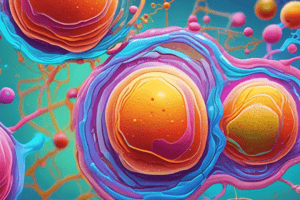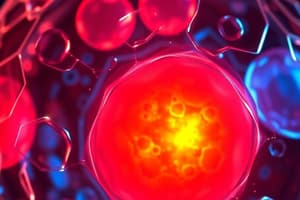Podcast
Questions and Answers
What is one primary function of membrane-bound organelles in cells?
What is one primary function of membrane-bound organelles in cells?
- To increase the rate of cellular respiration.
- To create compartments for specialized functions. (correct)
- To maintain a constant temperature within the cell.
- To serve as storage for excess nutrients.
How do membrane-bound organelles contribute to solving the surface area to volume problem?
How do membrane-bound organelles contribute to solving the surface area to volume problem?
- By increasing the volume of the cytoplasm.
- By increasing the amount of membrane available. (correct)
- By reducing the overall size of the cell.
- By eliminating waste products more efficiently.
What role does the nucleus serve within the cell?
What role does the nucleus serve within the cell?
- It assists in the formation of ribosomes.
- It holds the nuclear genome and separates hereditary material. (correct)
- It produces energy for the cell.
- It stores proteins for cellular function.
What is the significance of molecules moving into and out of the cell?
What is the significance of molecules moving into and out of the cell?
Which statement best describes membrane-bound organelles?
Which statement best describes membrane-bound organelles?
What hypothesis is proposed regarding the evolution of the endomembrane system?
What hypothesis is proposed regarding the evolution of the endomembrane system?
What is the primary role of vesicles in the endomembrane system?
What is the primary role of vesicles in the endomembrane system?
Which two compartments are directly connected by vesicles in the endomembrane system?
Which two compartments are directly connected by vesicles in the endomembrane system?
Which of the following best describes vesicles?
Which of the following best describes vesicles?
What is a common function of the Golgi apparatus within the endomembrane system?
What is a common function of the Golgi apparatus within the endomembrane system?
Which of the following components is NOT found in eukaryotic cells?
Which of the following components is NOT found in eukaryotic cells?
Which structure is responsible for energy production in eukaryotic cells?
Which structure is responsible for energy production in eukaryotic cells?
The endoplasmic reticulum is primarily involved in which of the following processes?
The endoplasmic reticulum is primarily involved in which of the following processes?
In plant cells, which of the following structures is responsible for photosynthesis?
In plant cells, which of the following structures is responsible for photosynthesis?
What is the function of the cytoskeleton in eukaryotic cells?
What is the function of the cytoskeleton in eukaryotic cells?
Which organelle is responsible for modifying, sorting, and packaging proteins?
Which organelle is responsible for modifying, sorting, and packaging proteins?
What is a key difference between prokaryotic and eukaryotic cells?
What is a key difference between prokaryotic and eukaryotic cells?
Which component of the eukaryotic cell is involved in detoxifying harmful substances?
Which component of the eukaryotic cell is involved in detoxifying harmful substances?
What is the primary function of the Nuclear Pore Complex?
What is the primary function of the Nuclear Pore Complex?
What is the Nuclear Localization Signal (NLS)?
What is the Nuclear Localization Signal (NLS)?
Which of the following best describes the Endomembrane System?
Which of the following best describes the Endomembrane System?
What is the role of a Nuclear Export Signal (NES)?
What is the role of a Nuclear Export Signal (NES)?
How do membranes of the Endomembrane System relate to one another?
How do membranes of the Endomembrane System relate to one another?
Which process is NOT a function of the Endomembrane System?
Which process is NOT a function of the Endomembrane System?
What are the nuclear envelope's main structural features?
What are the nuclear envelope's main structural features?
What facilitates the regulation of traffic between the nucleus and cytoplasm?
What facilitates the regulation of traffic between the nucleus and cytoplasm?
Flashcards
Prokaryotic Cells
Prokaryotic Cells
Cells without a nucleus or membrane-bound organelles.
Eukaryotic Cells
Eukaryotic Cells
Cells with a nucleus and membrane-bound organelles.
Nucleus
Nucleus
The control center of the cell, containing the genetic material (DNA).
Ribosomes
Ribosomes
Signup and view all the flashcards
Endomembrane System
Endomembrane System
Signup and view all the flashcards
Mitochondria
Mitochondria
Signup and view all the flashcards
Cytoskeleton
Cytoskeleton
Signup and view all the flashcards
Plasma membrane
Plasma membrane
Signup and view all the flashcards
Animal Cell Membrane-Bound Organelles
Animal Cell Membrane-Bound Organelles
Signup and view all the flashcards
Cell Movement of Molecules
Cell Movement of Molecules
Signup and view all the flashcards
Nucleus and Nuclear Genome
Nucleus and Nuclear Genome
Signup and view all the flashcards
Surface Area to Volume Ratio
Surface Area to Volume Ratio
Signup and view all the flashcards
Cell Compartments
Cell Compartments
Signup and view all the flashcards
Endomembrane System Hypothesis
Endomembrane System Hypothesis
Signup and view all the flashcards
Specialized Proteins
Specialized Proteins
Signup and view all the flashcards
Protein Transport
Protein Transport
Signup and view all the flashcards
Vesicles
Vesicles
Signup and view all the flashcards
Examples of Vesicle Transport
Examples of Vesicle Transport
Signup and view all the flashcards
Nuclear Envelope
Nuclear Envelope
Signup and view all the flashcards
Nuclear Pore Complexes
Nuclear Pore Complexes
Signup and view all the flashcards
NLS (Nuclear Localization Signal)
NLS (Nuclear Localization Signal)
Signup and view all the flashcards
NES (Nuclear Export Signal)
NES (Nuclear Export Signal)
Signup and view all the flashcards
What are the functions of the Endomembrane System?
What are the functions of the Endomembrane System?
Signup and view all the flashcards
Why are the membranes in the Endomembrane System so similar?
Why are the membranes in the Endomembrane System so similar?
Signup and view all the flashcards
What is the main purpose of the Endomembrane System?
What is the main purpose of the Endomembrane System?
Signup and view all the flashcards
Study Notes
Prokaryotic Cells
- Prokaryotic cells are significantly smaller than eukaryotic cells.
- They lack a nucleus and other membrane-bound organelles.
- Prokaryotes include bacteria and archaea.
Textbook Information
- Hard copies of the textbook are no longer available from the publisher.
- Options to acquire the textbook include purchasing a used copy, borrowing it from the library, or buying the 4th edition for the same price as indicated on the eClass website.
Lab 1 Information
- Lab 1 begins this week (week of Sept 16th) for all groups (1-8).
- Participants will not attend an in-lab session for Lab 1.
- The lab is completed independently and can be completed before September 22nd.
- Lab 1 materials are provided via the Simbio virtual lab software, details of which are available in the Lab 1 section of eClass.
- The access key is located within the "SimUText Registration Instructions for Students (Fall 2024)" document.
- Students must purchase the lab manual from the bookstore before Lab 1 starts.
Quizzes Information
- An eClass quiz was available today.
- The first Mastering Biology quiz will be available next Monday.
- A practice quiz with no grade weight will be available this week.
- These quizzes are used for familiarization with the Mastering Biology format.
Learning Strategies
- Study Cycle: A recommended approach to learning.
- Using Learning Outcomes: A strategy for active learning.
- Metacognition: A method involving analyzing one's own thought processes.
- Evidence-based study strategies: Strategies supported by research.
Metacognition Definition
- Metacognition is described as having a "big brain outside of your brain" that observes and analyzes the operations of your "regular" brain.
Prokaryotes
- Prokaryotes are bacteria/archaea cells.
- This information can be found by reviewing past slides.
Eukaryotic Cell Structure, Function, and Evolution
- This is a study topic related to eukaryotic cells.
The Eukaryotic Cell
- Eukaryotic cells are larger than prokaryotic cells.
- The genetic material (genome) is enclosed within a nuclear envelope.
- Eukaryotic cells contain membrane-bound organelles with specific functions.
- These cells have a cytoskeleton containing motor proteins.
Major Eukaryotic Organelles
-
Nucleus (including its lamina and nucleolus)
-
Ribosomes
-
Endomembrane System (includes the endoplasmic reticulum, Golgi apparatus, lysosomes, and vacuoles)
-
Nuclear envelope (or membrane)
-
Mitochondria
-
Chloroplasts
-
Cytoskeleton
-
Plasma membrane
-
Cell wall (some eukaryotes only, not all)
-
Note: Peroxisomes are excluded from this list.
Basic Structure of Animal and Plant Cells
- Information about the basic structure of animal and plant cells.
- Understanding of general structure and function of organelles is necessary.
BioFlix Tours
- Check out the BioFlix tours of animal and plant cells on Mastering Biology.
Membrane Bound Organelles
- These organelles increase the surface area relative to volume, increasing the capacity for membrane-requiring reactions.
- They create compartments that lead to specialization of function within the cell.
Molecules in the Cell
- Molecules continuously move throughout the cell, in and out of the cell, and between different structures.
The Nucleus
- The nucleus contains the nuclear genome.
- It separates hereditary material from the rest of the cell.
- The nucleus is surrounded by a double membrane (also called a nuclear envelope), which consists of two lipid bilayers.
The Nuclear Lamina
- The nuclear lamina provides structural support.
- It is found inside the nucleus, positioned under the double membrane.
- It is composed of intermediate filaments.
Nucleolus
- The nucleolus is responsible for ribosomal RNA (rRNA) synthesis and ribosomal subunit assembly.
- It is a non-membrane-bound structure within the nucleus.
Nuclear Transport
- Nuclear pores control the movement of substances into and out of the nucleus.
- Molecular transport is regulated by the pores, the main pathways within the nuclear envelope.
Nuclear Pore Complexes
- Multiprotein complexes are embedded in the nuclear envelope.
- They control the transport of molecules between the cytoplasm and nucleus.
Targeting Molecules to the Nucleus
- Larger molecules can be targeted to the nucleus.
- Signal sequences are involved in regulating traffic between the nucleus and cytoplasm.
- A Nuclear Localization Signal (NLS) is an amino acid sequence directing movement to the nucleus. Other proteins also play roles.
Signal Sequences
- Signal sequences aid in regulating traffic between the nucleus and cytoplasm.
- Specific sequences direct proteins to different locations within the cell or vice-versa (out of the nucleus).
- Nuclear Export Signals (NES) facilitate transport out of the nucleus.
The Nuclear Envelope and the Endomembrane System
- The nuclear envelope is part of the endomembrane system.
- The endomembrane system consists of related membranes (e.g., nuclear envelope, endoplasmic reticulum, Golgi, lysosomes, vesicles, and vacuoles) that are structurally and functionally interconnected.
Endomembrane System Functions
- The endomembrane system carries out numerous functions within the cell:
- Synthesis, modification, and secretion of proteins
- Synthesis of lipids and detoxification of toxins
- Transport and breakdown of large biomolecules
Endomembrane System Evolution
- A hypothesis suggests that the various membranes of the endomembrane system arose as invaginations or infoldings of the plasma membrane.
Endomembrane System Proteins
- Different parts of the endomembrane system require specific proteins.
Protein Movement Between Cell Compartments
- Vesicles are frequently utilized for moving proteins between cell compartments.
- Vesicles are membrane-enclosed sacs that facilitate the transport of materials between different cell organelles or from the cell to the external environment.
Studying That Suits You
Use AI to generate personalized quizzes and flashcards to suit your learning preferences.
Related Documents
Description
Explore the essential functions and roles of membrane-bound organelles in cells through this quiz. Learn about the significance of the nucleus and how these structures help manage the surface area to volume ratio. Test your knowledge on cell transport mechanisms and organelle characteristics.




